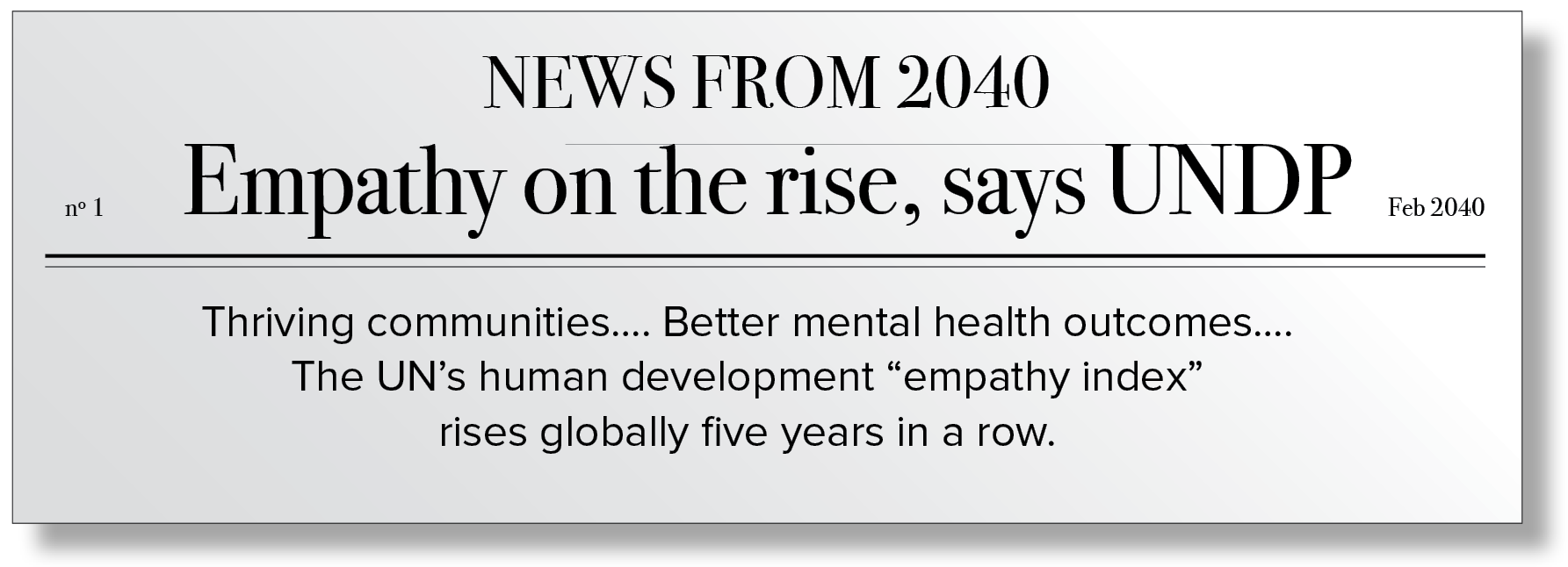Theme 12
Why aren’t we talking about a social recession?
With the global economy on the brink of recession, we are in the midst of a social recession that is equally consequential for societies and economies but is much less factored into calculations about our future: loneliness, mental health declines, stress in the workplace and trust at an all-time low.
Signals
A 2021 survey showed 33% of adults worldwide experienced feelings of loneliness [164] . The WHO [165] notes that widespread social isolation among older people harms their health and quality of life, while loneliness is growing across western societies, with young people among the worst affected [166]. Friendships and community involvement are declining [167] in the US. Distrust [168] is society’s default emotion; fewer than 30% of people globally believe most people can be trusted. These trends affect physical health; one study of Chinese adults showed that loneliness can speed the ageing [169] process more than smoking. Austrian doctors are writing “social prescriptions" [170] against loneliness.
With one in eight people worldwide suffering from mental health issues, providing mental health and psychosocial support [171] is more necessary than ever. Those excluded by the digital divide [172] are at particular risk. In Jordan, increasing suicides [173] are prompting calls for additional mental health services. UNDP's Arab States’ Women Innovators Programme [174] is attracting more startups focusing on mental health. Friendship Benches [175] – where grandmothers provide talk therapy - are addressing loneliness and fostering intergenerational connectedness in Zimbabwe and beyond.
A gender backlash is hurting women, ranging from misogyny [176] to lethal violence [177] within their own families. Intersecting inequalities put some at heightened risk: girls and women with disabilities [178] are more likely to be illiterate, unemployed or living in poverty; a survey of LGBTQI+ people in Thailand showed that half of the respondents had contemplated suicide. [179]
Some 30-35% of young people surveyed in 45 countries have taken time off work [180] due to stress. “Quiet quitting” [181] by burned-out employees is gaining momentum in the US. Only one-fifth of employees globally describe themselves as “engaged” at work [182] and stress has reached an all-time high. Wellbeing in South Asia and Europe dropped 5 percentage points in the past year, and workers’ hopes for the future declined too. Only 10% of workers in Sub-Saharan Africa are living comfortably on their present household income. Covid hit women’s livelihoods [183] particularly hard; 58% of employed women work in the informal sector, without paid sick leave or unemployment benefits, with an unpaid care burden three times greater than men’s.
Trends
Mental health stressed
Shifting nature of work
Backlash against gender equality
Illustrative Signals
33% of adults worldwide feel lonely
30-35% of young people in 45 countries have taken time off work due to stress
In Thailand, half of LGBTQI+ respondents to survey had contemplated suicide
Grandmothers provide talk therapy on Friendship Benches in Zimbabwe and beyond
So what for development
A loss of hope and optimism for the future will have devastating consequences for economies and societies, especially for younger generations. The Human Development Report demonstrated how mental distress constrains human development, limiting people’s freedom and ability to live life as they choose. We understand increasingly well the importance of mental health, trust and social cohesion for progress towards the SDGs – so why are we still under-investing in them?
The strength of the social fabric – and the future of societies - depends on these connections, trust and ties of community. Preserving or rebuilding people’s sense of trust and community is especially important when polarization is growing and social contracts need to be rethought or reinvigorated. This is perhaps even more true in countries that are more at risk (eg highly indebted, or vulnerable to climate change), fragile or conflict-affected, even though these may have the fewest resources to address them.
Imagining the future
What might our world look like in 2040?
Fictional snippets from a possible future!


 Locations
Locations

